Published Jul 5, 2024
How Ron Moore Subtly Rebooted The Next Generation with 'The Bonding'
Here's why the series' Season 3 episode was an unquestionable game changer.
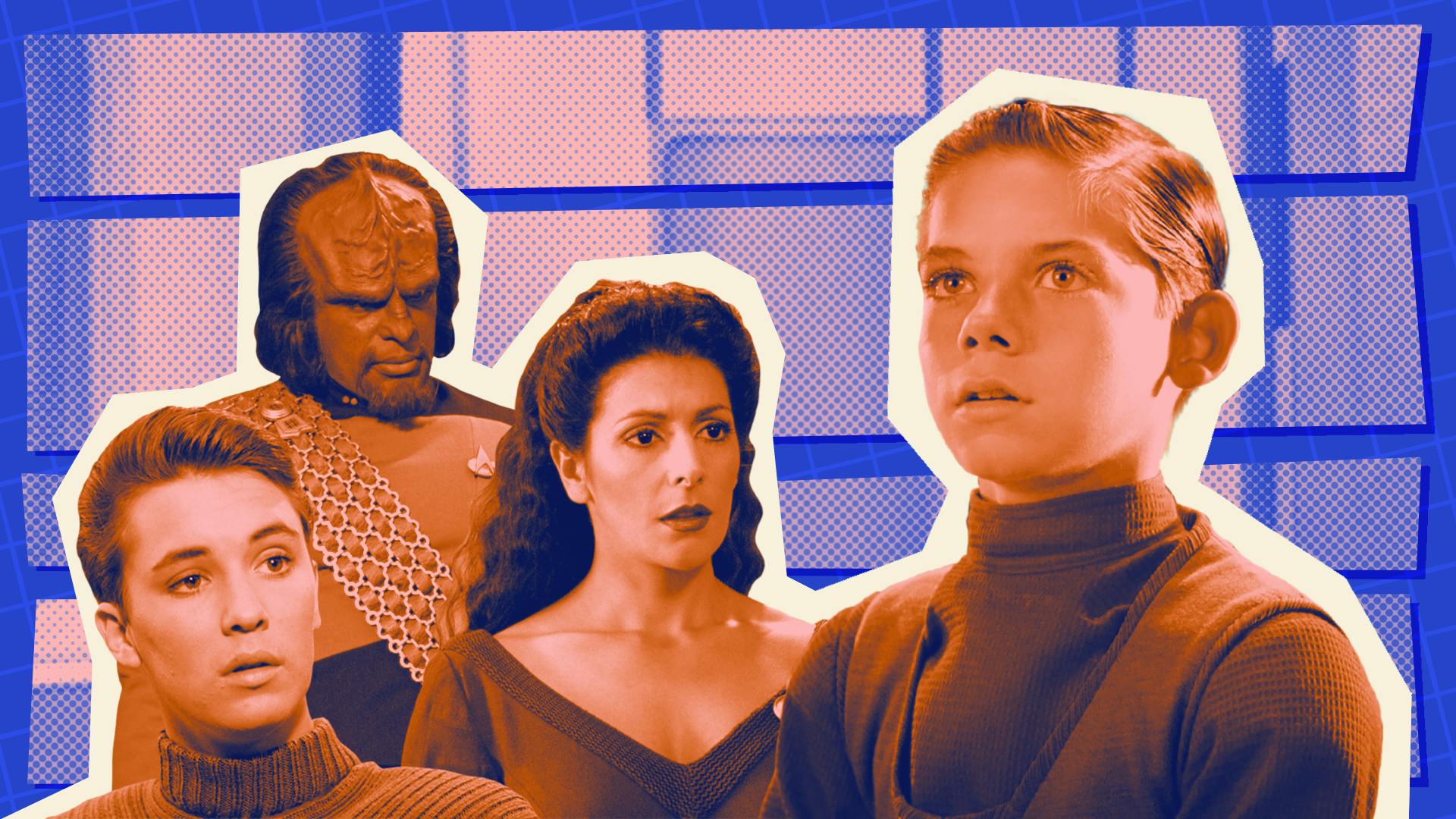
StarTrek.com
In the original '60s Star Trek, if a random crew member got vaporized, impaled with a spear, or sucked dry by a salt vampire, Captain Kirk and company usually moved on pretty quickly. But, over 30 years ago, flipped the script on the sacrificial red shirt trope and shifted the entire storytelling tone of the franchise.
When Ronald D. Moore wrote the Season 3 episode "," he helped subtly reboot and reshape what fans came to expect from The Next Generation. This wasn't only a space adventure series that happened to tackle social issues; the voyages of the starship Enterprise were also about very real explorers and the people they loved.
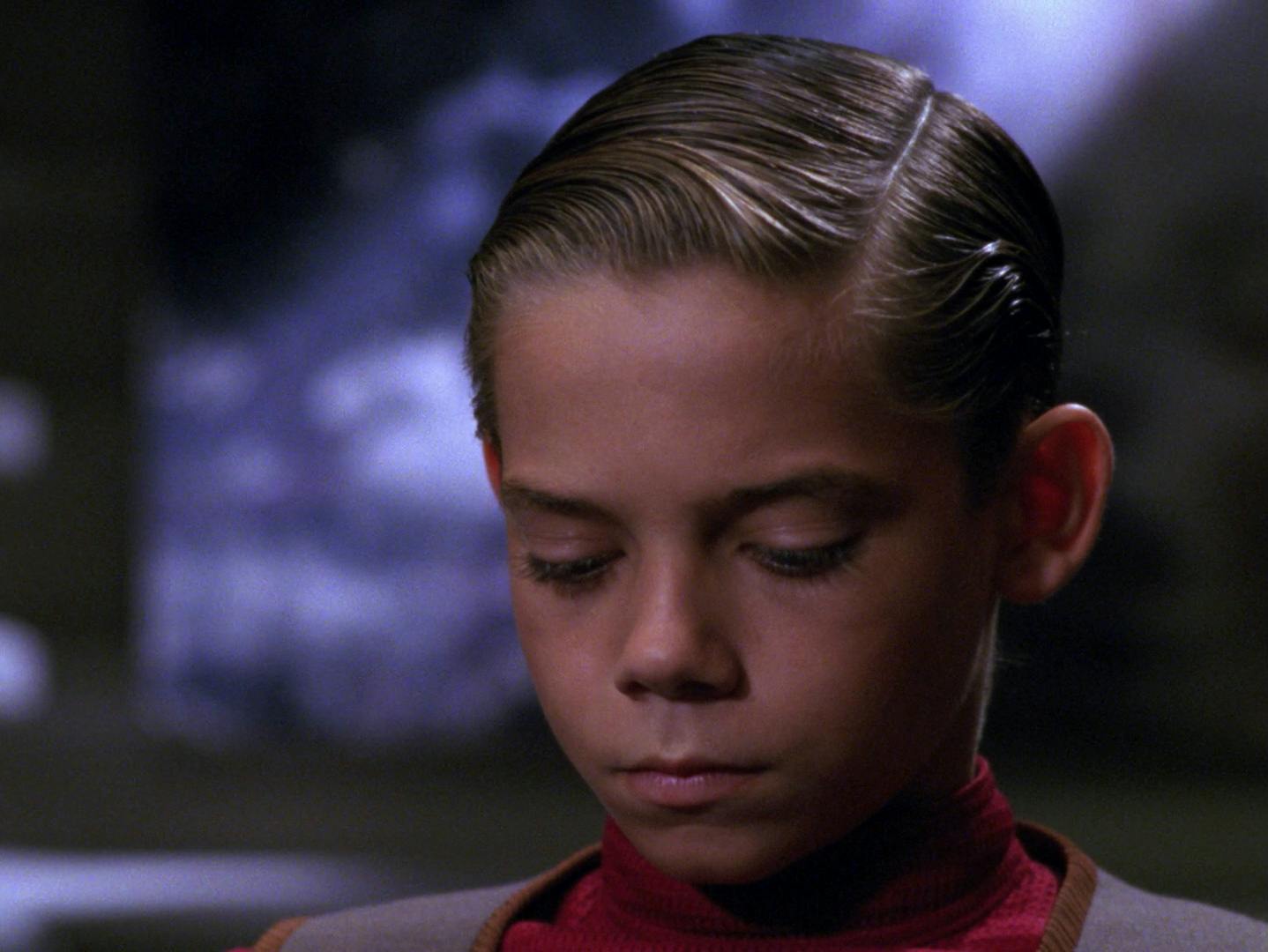
"The Bonding"
StarTrek.com
Though "The Bonding" is a quiet episode, it starts with a bang; a crew member is killed before the credits even roll! Marla Aster wasn't anyone we'd heard of before, but rapidly, that kind of becomes the point. When Worf leads an away team to the surface of a planet for a low-key archaeological dig, a hidden explosive is tripped, and Aster — a Starfleet officer and archaeologist — is suddenly dead. Making matters worse, Lt. Aster was a single mom and her son Jeremy is now orphaned aboard the Enterprise.
Although the plot of "The Bonding" does eventually bring in an alien science fictional element, the thrust of the story is mostly about the deeply personal consequences of boldly going where no one has gone before. "The Bonding" lingers on what it would really be like when someone was suddenly hit with an alien death ray, and examines what that means for a story beyond simply raising the stakes for the primary characters.
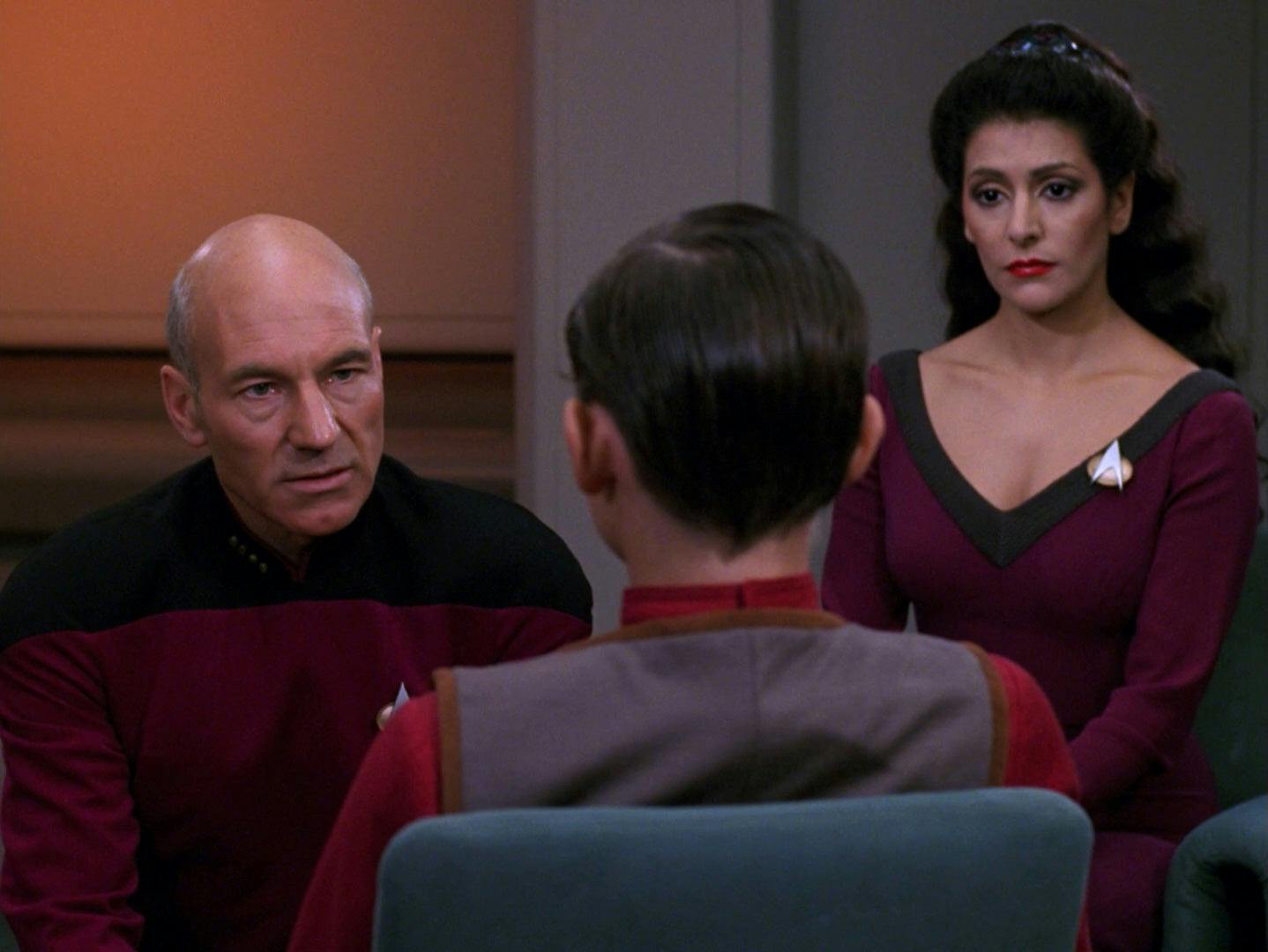
"The Bonding"
StarTrek.com
In a fraught and fantastic scene, as Picard and Troi are on their way to break the news to young Jeremy, Picard rants about how much he hates having families aboard the Enterprise. Picard feels like it's unfair to kids like Jeremy; his mom made the choice to join Starfleet, whereas her son was just along for the ride. Troi sympathizes, but it doesn’t change the fact that they still have to tell a little kid that his mom was killed by an alien explosive.
Picard does not turn to the camera and say, "This never happened to the other captains," but he very well could have. Captain Kirk certainly had to break some bad news to various crewmembers about loved ones ("" comes to mind, actually), but telling a little kid their mother has died because of a fairly pointless and ancient alien tech? This is next-level realism.
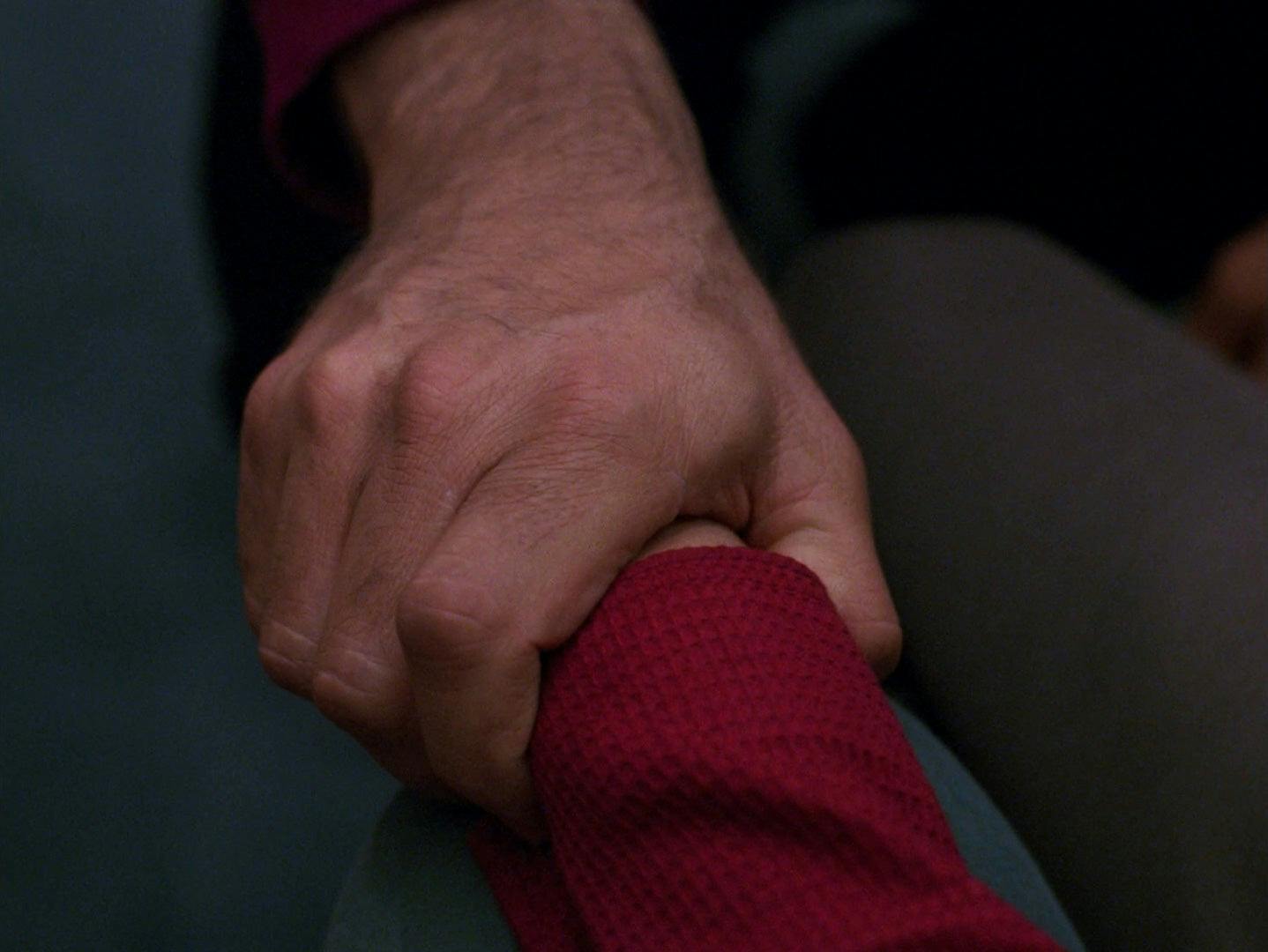
"The Bonding"
StarTrek.com
And the scene that follows sums-up exactly what The Next Generation would be like for the rest of its run. Because Jeremy Aster's dad had also previously died, he says, "I’m all alone now." Picard responds by taking Jeremy's hand and responds firmly, "On the starship Enterprise, no one is alone," and then with that extra Patrick Stewart emphasis, he says again. "No one." You just got chills thinking about it, right?
This scene is important in many ways, but the historical context makes it even more significant. "The Bonding" aired on October 23, 1989, and was the fifth episode of the third season of The Next Generation. In 1989, this was a fundamentally different show than it had been for the first two seasons. The opening credits ditched our own solar system in favor of a lush, wild-looking final frontier, Gates McFadden was back as Dr. Beverly Crusher, and the crew were all rocking redesigned uniforms that actually looked like clothes people would enjoy wearing. The Enterprise crew felt cozy and comfortable, and as a result, the third season exudes a confidence and consistency in style and tone that, arguably, the first two seasons lacked. To be clear, The Next Generation was brilliant from the start, but visually and thematically, the series congealed and grew-up in Season 3. So, when Picard reached out and told Jeremy Aster that no one was alone on the Enterprise, in a sense, he was reaching out to all the viewers, too. The message of "The Bonding" was clear. With this crew, you were in good hands.
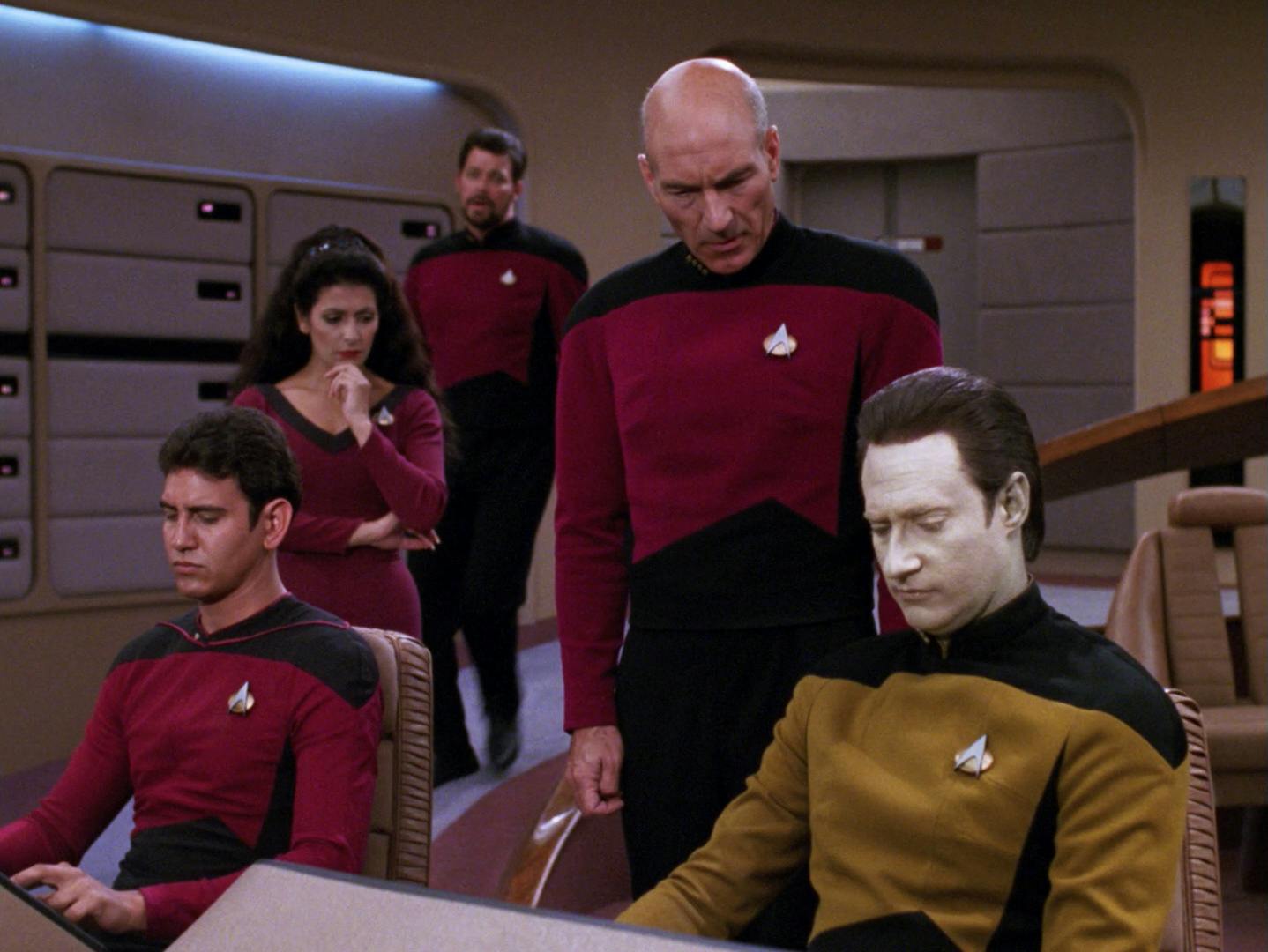
"The Bonding"
StarTrek.com
We tend to think of The Next Generation at its highest points, specifically, the famous Season 3 finale, "," in which Picard is assimilated by the Borg and fans really had to sit through a summer wondering if Riker was the new captain. (I was 8-years-old, it was rough!) But, what we forget is that, in order to get to those epic moments, TNG had to earn our trust, and part of that happened in a paradigm shift in the way it told stories, starting with "The Bonding."
Famously, producer Michael Piller instituted two huge changes in the way TNG episodes were written in Season 3. First, the show began accepting freelance script submissions from literally anyone. Second, Piller decided the new recipe for episodes would be to make sure each story focused on the primary characters and their relationships in specific. Though this sounds like common sense, at the time, it was fairly radical.
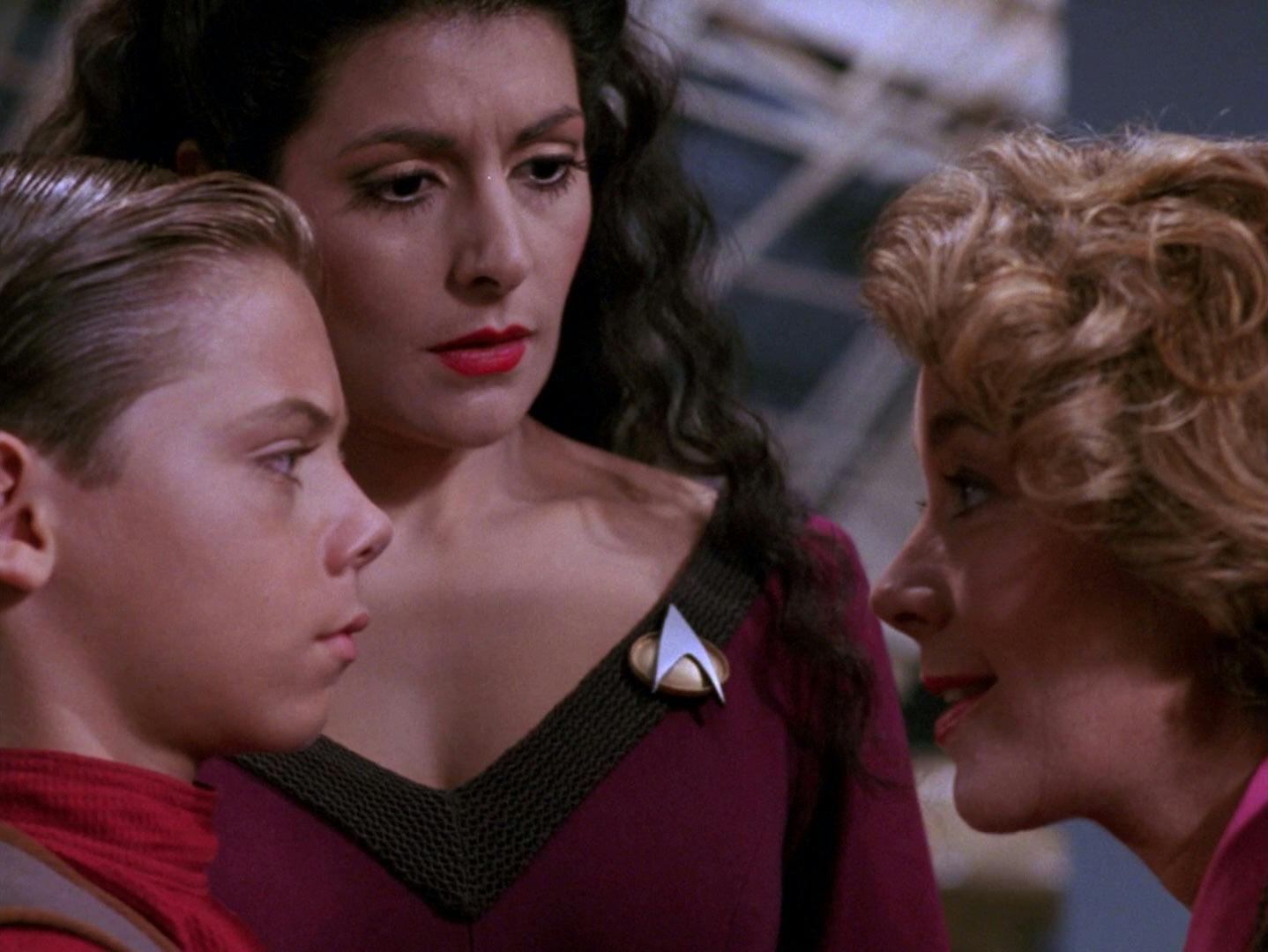
"The Bonding"
StarTrek.com
In the 2012 book, Star Trek: The Next Generation 365, writer Ronald D. Moore tells it like this, "When Michael Piller came in, he made a creative decision to shift the focus of the show from being about the planet and the aliens of the week to our characters aboard the Enterprise and how characters are affected by the story."
Moore's perspective on this was singular. As the writer of "The Bonding," Moore specifically benefited from the new open submission policy; prior to this episode, he wasn't a screenwriter for television at all. But, after the policy change, "The Bonding" got Moore a job in the TNG writers' room where he wrote or co-wrote several pivotal episodes of the third season, including the game-changing "." That episode was literally the first time Trek canon visited the Klingon Empire, and also introduced TNG's ongoing Worf storyline. Ronald D. Moore didn't invent the Klingons, but in many ways, he perfected how we think about their culture and their internal struggles. In fact, if you rewatch "Sins of the Father" back-to-back with 's Season 2 episode "," you'll see that L'Rell's struggles to stabilize the Klingon Empire, neatly paralleling the aesthetics and themes established in TNG.
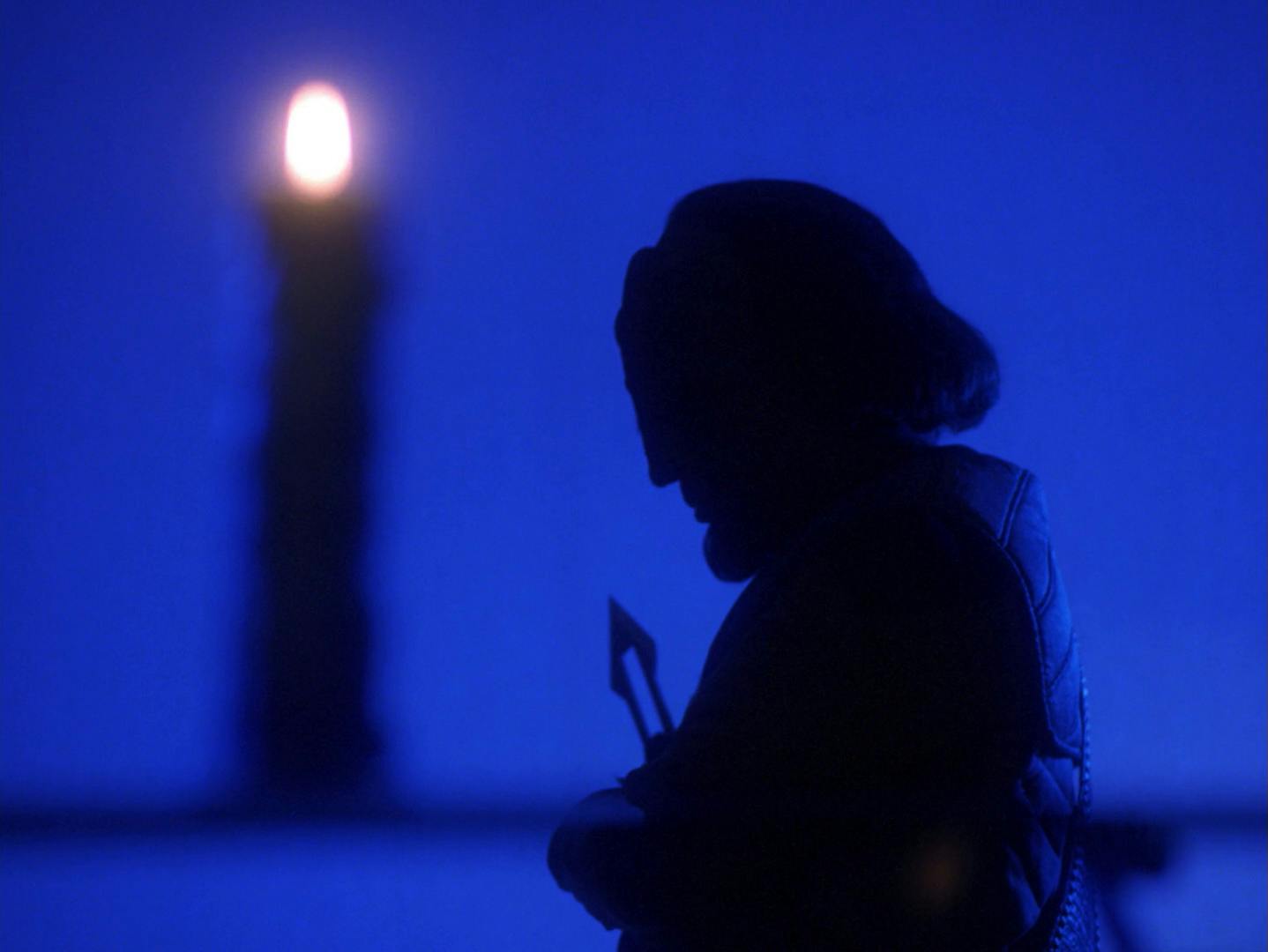
"The Bonding"
StarTrek.com
The effects of "The Bonding" and Ron Moore are bigger than elucidating Klingon canon. If Ron Moore hadn't sold "The Bonding" as a freelance spec script to TNG for Season 3, he wouldn't have gone on to be a producer on or eventually create the award-winning rebooted Battlestar Galactica in 2003. Along with Brannon Braga, Moore also wrote the TNG season finale, "" as well as the films and the wildly popular . In essence, one story about a side character and her orphaned son, led to some of the boldest Trek adventures of all.
In order to go big, TNG's third season had to first go small. Episodes like "The Bonding" and "Sins of the Father" are interesting studies in the patient slow-burn of TNG, a type of storytelling that would briefly masquerade as one kind of episode, only to raise the stakes in a very personal way. For the first 15-minutes of "Sins of the Father," the viewer thinks the episode is about the Enterprise taking on a bossy new Klingon officer named Kurn, but then, the real stakes reveal themselves — Kurn is Worf's secret brother! In a microcosm, this is what TNG did best; unfurl a kooky sci-fi premise, and then raise the stakes not with action, but with deep-dives into character.
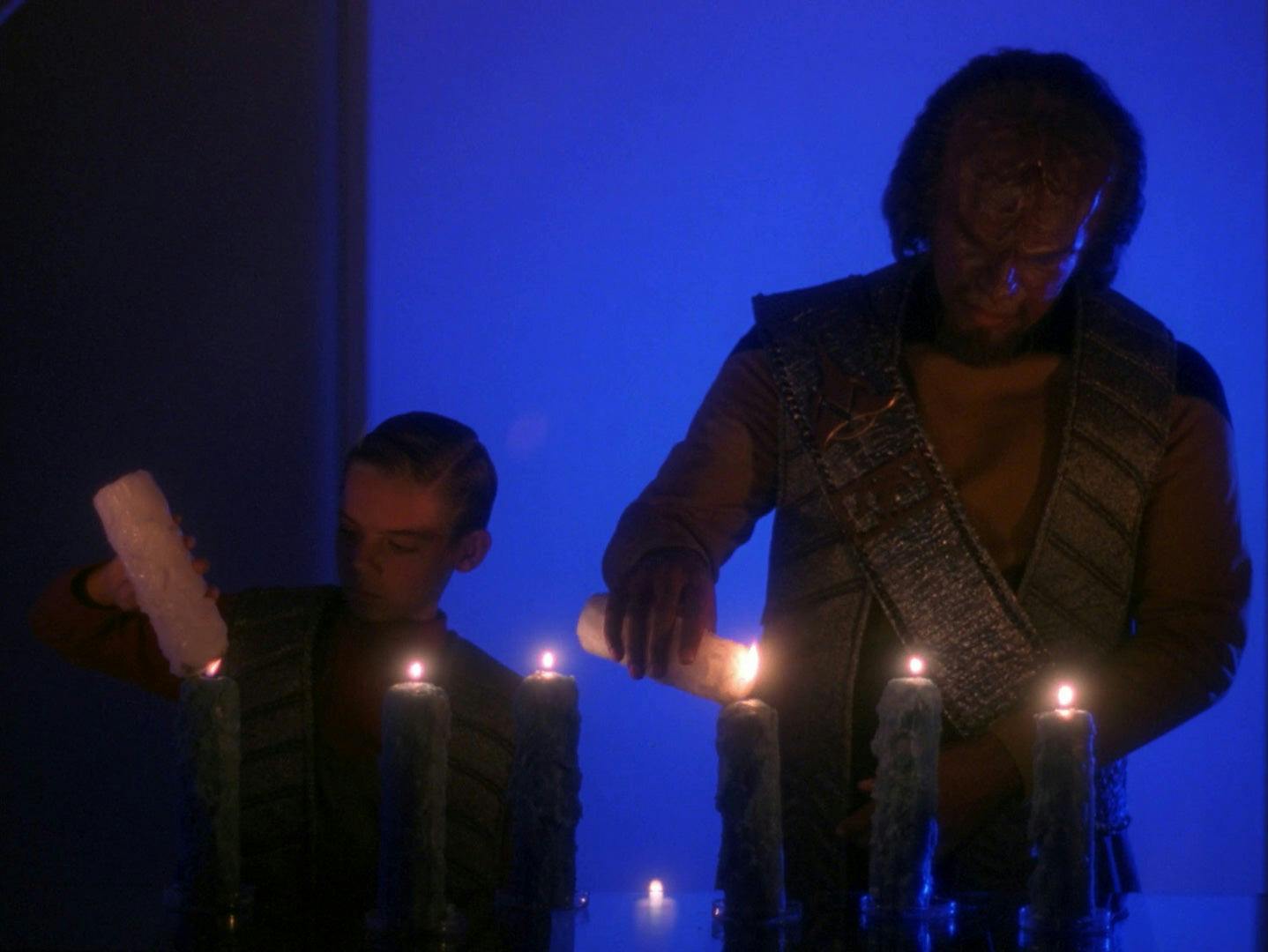
"The Bonding"
StarTrek.com
The climax of "The Bonding" may not be a TNG ending that would rank as the most nail-biting, but it is one of the smartest Trek scripts of all time. After Jeremy Aster's mother Marla is killed, a well-meaning alien lifeform attempts to recreate her, and offers to take Jeremy into a fantasy life in which his mom, and even his old cat, are still alive. It's kind of like the fantasy the Talosians give to Captain Pike and Vina in "The Menagerie," only it's a little kid and he's got his whole real life ahead of him. Throughout the entire episode, Worf struggles with his guilt about the death of Jeremy's mother, because, after all, he was the guy who was in command when she died. Like Jeremy, Worf is also an orphan, so he wants to bond with the kid in a Klingon ceremony where they celebrate the life of his late mother.
But Worf's plans to do the right thing are being screwed-up by the alien-creature who is pretending to be Jeremy's mother. Eventually, this all results in nearly half the cast, sitting down and talking to Jeremy about the realities of death.
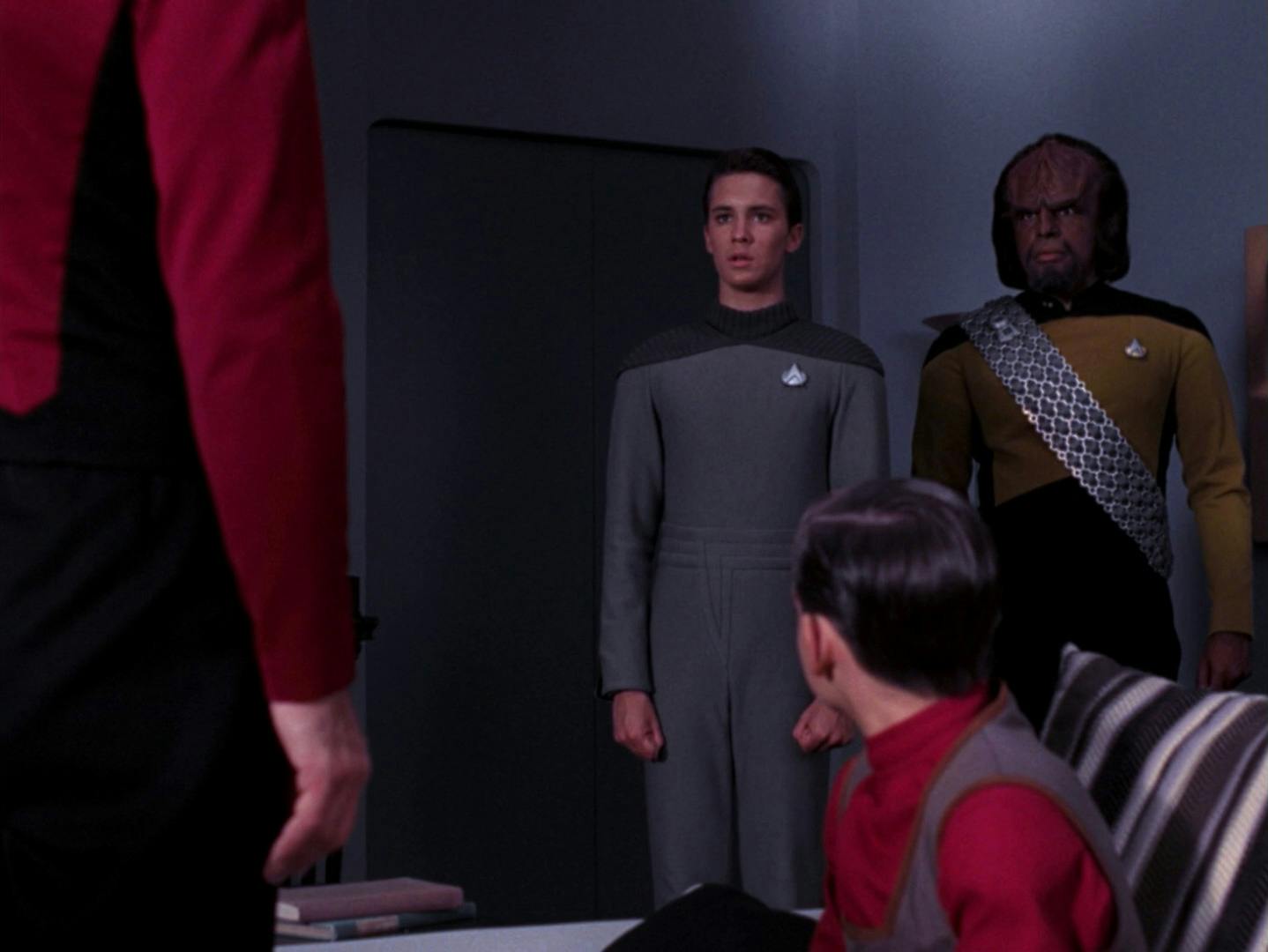
"The Bonding"
StarTrek.com
What's so brilliant about this is that the story tugs on previously planted character threads in unexpected ways. Though the episode is ostensibly about Worf and Jeremy, the final moments allow Wesley Crusher to really vent about how much he used to hate Picard's guts after Wesley's dad died. Wesley admits he didn't really like Captain Picard for a long time, which in some ways might have paralleled the shaky feeling fans had about The Next Generation in general. "I was angry at you," Wesley tells Picard. "You came home and my father didn't."
For fans who were still longing to see Captain Kirk and Spock show up on the new Star Trek, this could have felt like a sublimation of those frustrations. Picard was the stuffy, no-nonsense leader of the new Enterprise, and for two seasons, fans weren't quite sure what to make of him. But with Season 3, something began to lighten up. Picard was reaching out. Wesley was no longer mad at his new captain and, seemingly, no one else was either. The family had finally come together and nothing would ever be the same again.

